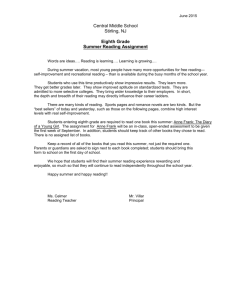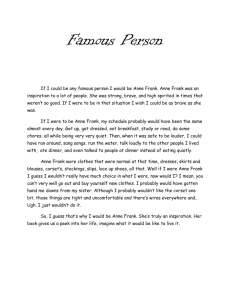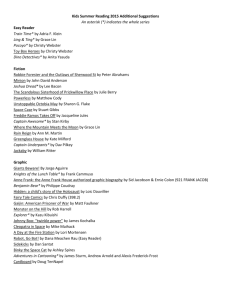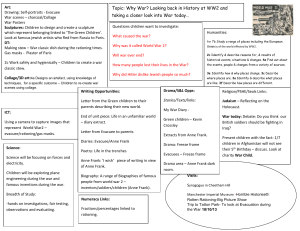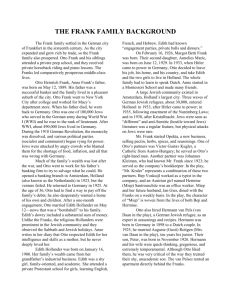Otto Frank feature article to analyze
advertisement
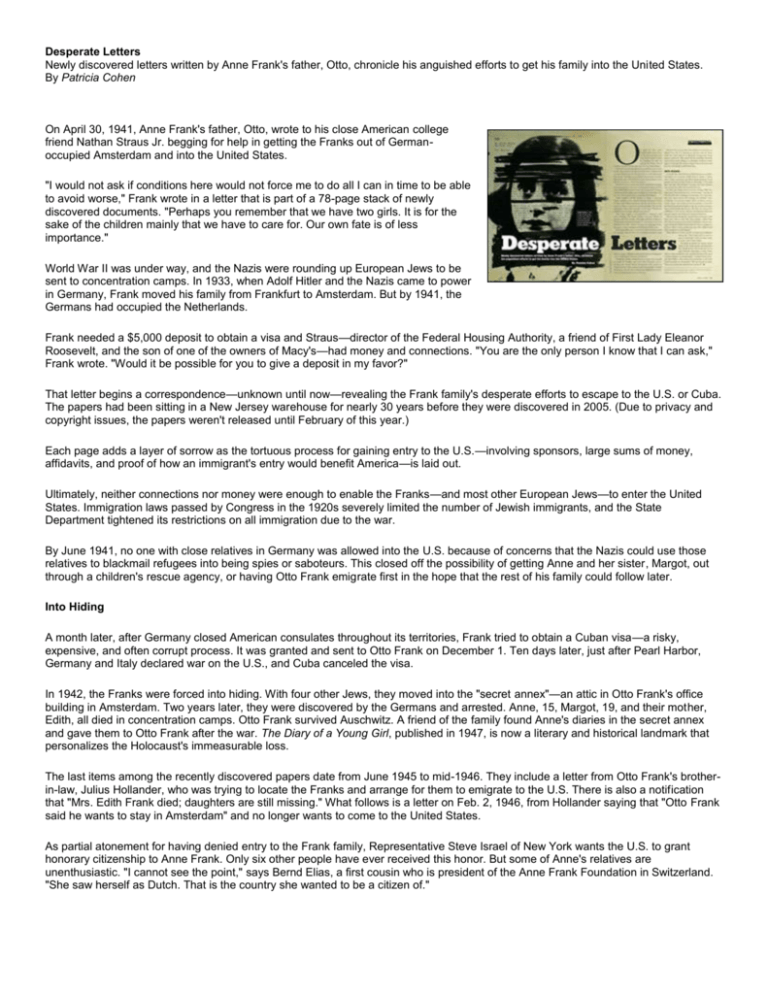
Desperate Letters Newly discovered letters written by Anne Frank's father, Otto, chronicle his anguished efforts to get his family into the United States. By Patricia Cohen On April 30, 1941, Anne Frank's father, Otto, wrote to his close American college friend Nathan Straus Jr. begging for help in getting the Franks out of Germanoccupied Amsterdam and into the United States. "I would not ask if conditions here would not force me to do all I can in time to be able to avoid worse," Frank wrote in a letter that is part of a 78-page stack of newly discovered documents. "Perhaps you remember that we have two girls. It is for the sake of the children mainly that we have to care for. Our own fate is of less importance." World War II was under way, and the Nazis were rounding up European Jews to be sent to concentration camps. In 1933, when Adolf Hitler and the Nazis came to power in Germany, Frank moved his family from Frankfurt to Amsterdam. But by 1941, the Germans had occupied the Netherlands. Frank needed a $5,000 deposit to obtain a visa and Straus—director of the Federal Housing Authority, a friend of First Lady Eleanor Roosevelt, and the son of one of the owners of Macy's—had money and connections. "You are the only person I know that I can ask," Frank wrote. "Would it be possible for you to give a deposit in my favor?" That letter begins a correspondence—unknown until now—revealing the Frank family's desperate efforts to escape to the U.S. or Cuba. The papers had been sitting in a New Jersey warehouse for nearly 30 years before they were discovered in 2005. (Due to privacy and copyright issues, the papers weren't released until February of this year.) Each page adds a layer of sorrow as the tortuous process for gaining entry to the U.S.—involving sponsors, large sums of money, affidavits, and proof of how an immigrant's entry would benefit America—is laid out. Ultimately, neither connections nor money were enough to enable the Franks—and most other European Jews—to enter the United States. Immigration laws passed by Congress in the 1920s severely limited the number of Jewish immigrants, and the State Department tightened its restrictions on all immigration due to the war. By June 1941, no one with close relatives in Germany was allowed into the U.S. because of concerns that the Nazis could use those relatives to blackmail refugees into being spies or saboteurs. This closed off the possibility of getting Anne and her sister, Margot, out through a children's rescue agency, or having Otto Frank emigrate first in the hope that the rest of his family could follow later. Into Hiding A month later, after Germany closed American consulates throughout its territories, Frank tried to obtain a Cuban visa—a risky, expensive, and often corrupt process. It was granted and sent to Otto Frank on December 1. Ten days later, just after Pearl Harbor, Germany and Italy declared war on the U.S., and Cuba canceled the visa. In 1942, the Franks were forced into hiding. With four other Jews, they moved into the "secret annex"—an attic in Otto Frank's office building in Amsterdam. Two years later, they were discovered by the Germans and arrested. Anne, 15, Margot, 19, and their mother, Edith, all died in concentration camps. Otto Frank survived Auschwitz. A friend of the family found Anne's diaries in the secret annex and gave them to Otto Frank after the war. The Diary of a Young Girl, published in 1947, is now a literary and historical landmark that personalizes the Holocaust's immeasurable loss. The last items among the recently discovered papers date from June 1945 to mid-1946. They include a letter from Otto Frank's brotherin-law, Julius Hollander, who was trying to locate the Franks and arrange for them to emigrate to the U.S. There is also a notification that "Mrs. Edith Frank died; daughters are still missing." What follows is a letter on Feb. 2, 1946, from Hollander saying that "Otto Frank said he wants to stay in Amsterdam" and no longer wants to come to the United States. As partial atonement for having denied entry to the Frank family, Representative Steve Israel of New York wants the U.S. to grant honorary citizenship to Anne Frank. Only six other people have ever received this honor. But some of Anne's relatives are unenthusiastic. "I cannot see the point," says Bernd Elias, a first cousin who is president of the Anne Frank Foundation in Switzerland. "She saw herself as Dutch. That is the country she wanted to be a citizen of."

